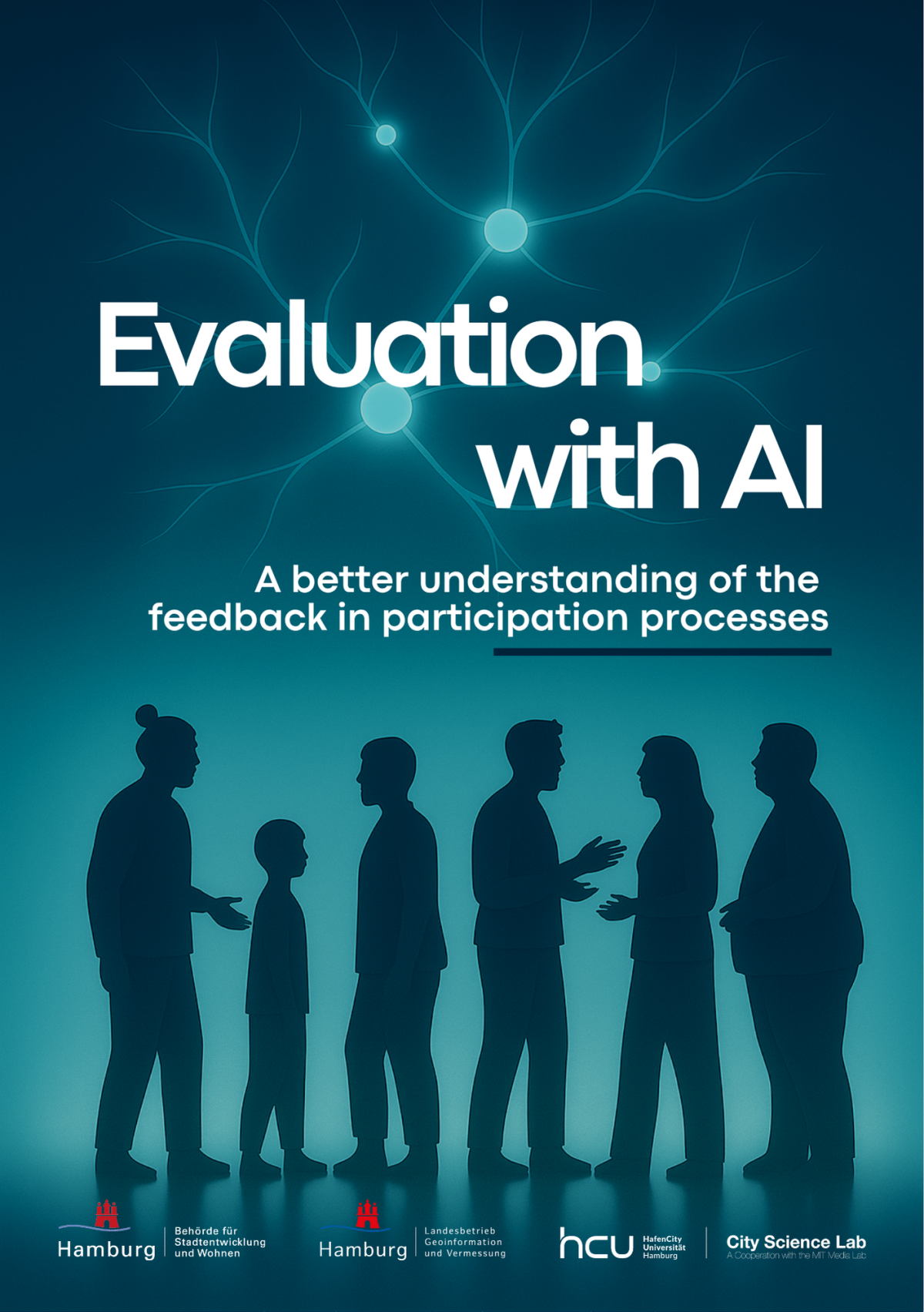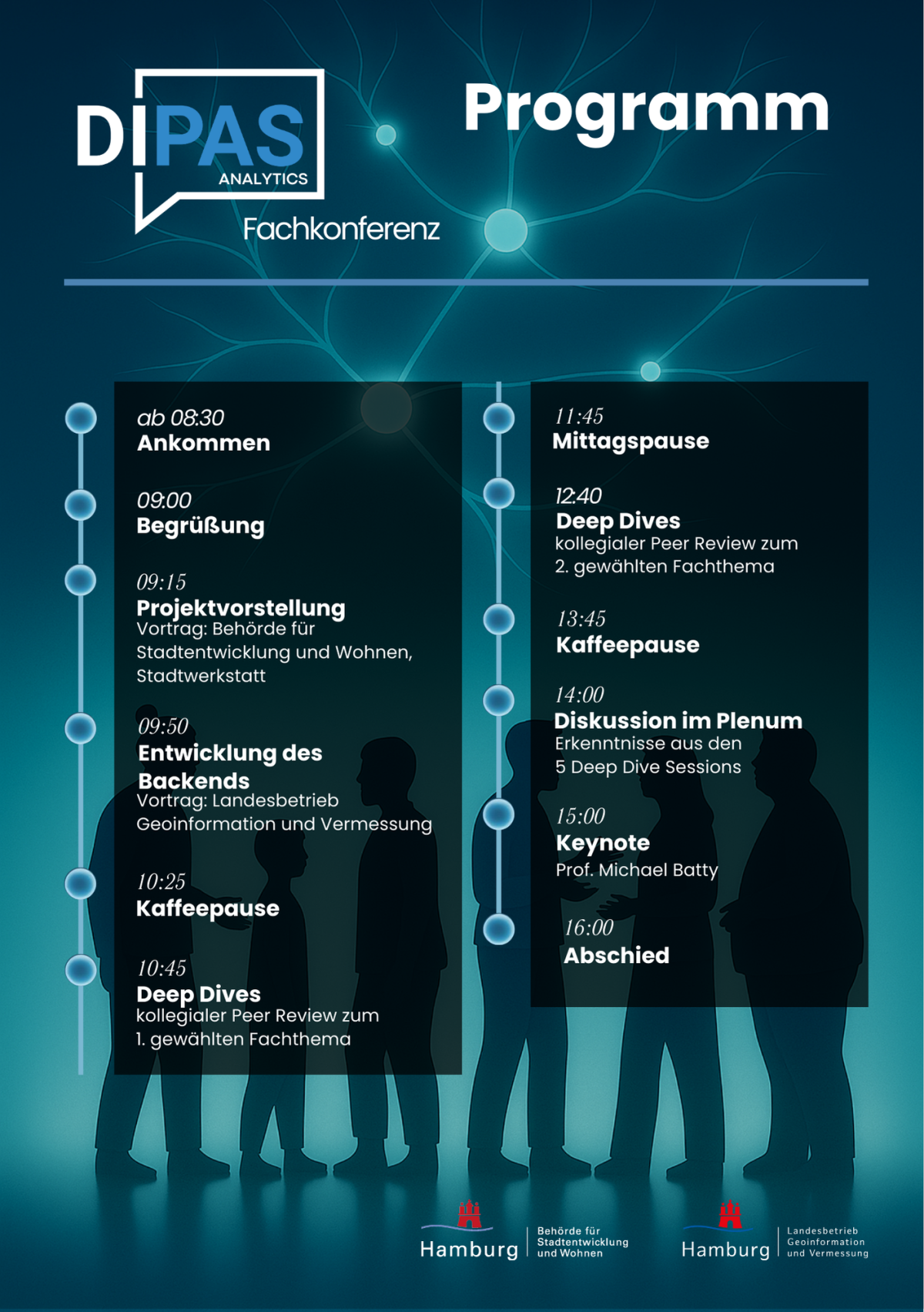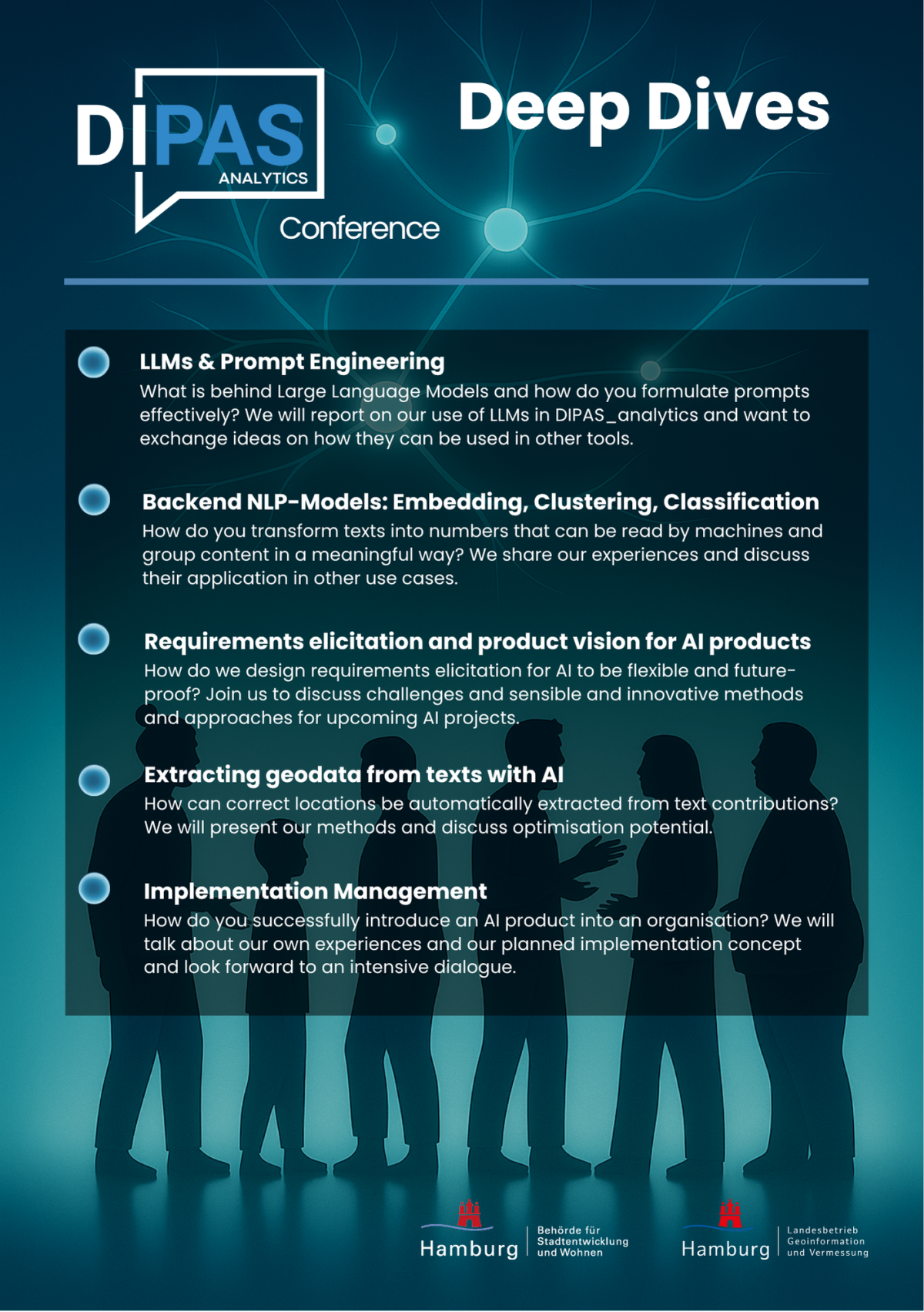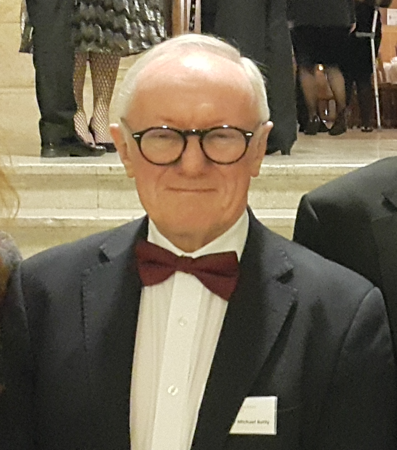Expert Conference DIPAS_analytics
Evaluation with AI: Understanding participation feedback better

Project Conclusion & Expert Conference
15th September 2025 · Hamburg
Urban planning thrives on the feedback from urban society - but the evaluation of this feedback is often time-consuming and not very standardised. This is precisely where the DIPAS_analytics project comes in. Since 2023, we have been working on the project in Hamburg to analyse participation processes more efficiently with the help of AI and urban data. The aim is to support project managers effectively in monitoring their ongoing process and in the subsequent evaluation of participation results - in a transparent, comprehensible and connectable way.
During the participation process, the DIPAS_analytics live dashboard helps to maintain an overview and facilitate targeted moderation. After completing a participation process, DIPAS_analytics Insights helps to pre-structure the textual and geo-referenced feedback in such a way that a faster, more organised and more efficient evaluation is possible.
The combination with urban geodata and AI-supported evaluation methods creates a new quality standard: experiences and perspectives from urban society are systematically linked with administrative data in order to make decision-making processes targeted, evidence-based and orientated towards people's needs. The tool supports the project managers in analysing their participation process according to their individual logic and questions. The final responsibility for the content of the evaluation always remains in human hands.
Over the past two and a half years, important foundations have been laid in Hamburg. The aim was to systematically utilise the local knowledge of civil society. To achieve this, it needed to be automatically pre-structured, manually checked and processed and meaningfully linked. The results can then be visualised - for administration, politics and the public.
At the end of the project, we are now inviting you to an expert conference that will combine technological insights, practical learnings and discussions about strategies, methodology and ethical issues.
We will be presenting the technical and methodological concept of DIPAS_analytics, while inviting critical discussions and seeking to develop it further together with the specialist public.
The conference is designed as a specialist symposium with a peer review character: a place for open exchange, reflection and impulses for the further development of AI-supported evaluation in participation processes.
Thank you!
"We would like to express our sincere gratitude for your participation in our DIPAS_analytics conference on 15 September 2025 in Hamburg. Your critical questions and constructive contributions to the discussion made the event a complete success. We are taking away many important ideas for our further work on DIPAS_analytics and hope that you also benefited from the open exchange."

Deep Dives
We want to delve deeper into specific content together with you offering five different topics. When you register, you can choose two topics that are of particular interest to you. We try to take all preferences into account as much as possible. In the Deep Dives, we will provide a brief technical input, but the main aim afterwards is to discuss and exchange ideas with you. Your own experiences are of great value. The Deep Dives focus on:

Here you can find more detailled information about the Deep Dives:
How do Large Language Models (LLMs) work and how can they be used effectively? In this Deep Dive, you will get a compact overview of everything you need to know about the technology behind LLMs, their use in your own software and the fine art of prompt engineering. We will examine current models, show how you can work with LLMs via APIs or your own hosting, and give an introduction to prompt engineering for beginners and advanced users. Using examples from the DIPAS_analytics project, we will discuss how tasks can be formulated correctly and efficiently and share our lessons learnt. There will also be plenty of room for discussion, sharing experiences and networking with experts and like-minded people.
Natural Language Processing, the machine processing of natural language, involves much more than just ChatGPT. In this Deep Dive, we will shed light on the basics of text processing in DIPAS_analytics: how can text be converted into numbers so that machines can understand it? What methods are available for grouping the content of texts and how do I choose the right approach for my use case? In this deep dive, we will look at the specific model selection for the NLP services in DIPAS_analytics, discuss our experiences from the design and implementation of NLP services and show which standards can be used for modular services. Together with you, we would like to evaluate how the services are used beyond the existing use cases and which other forms of text processing could be useful for citizen participation.
Eliciting requirements for AI-based applications such as DIPAS_analytics is associated with particular challenges. The rapid pace of technological development is continuously opening up new possibilities, which means that user expectations and requirements are constantly changing. We present how we approached the systematic development of a specialised concept and the theses, specific questions and methods on which the requirements elicitation was based. Here, ethical issues in the handling and use of AI also play a role. It is about the traceability, transparency and manipulability of AI-generated data. As part of this Deep Dive, we would like to share experiences with you, discuss existing challenges and develop new, innovative approaches with the aim of making requirements elicitation forward-looking and dynamic in the future.
DIPAS enables citizens to specify a location corresponding to their text contribution. But what if the location given barely matches the places actually described in the text, or doesn't match them at all? We have an answer for this case: the LGV has developed and evaluated various approaches that can be used to automatically extract the geolocation(s) actually described in the text. This also makes it possible for the first time to submit several locations simultaneously for a single text contribution. In this Deep Dive, we would like to present possible approaches to you in detail and weigh up their advantages and disadvantages. Together with you, we would like to discuss how these approaches can be further optimised and which practical requirements still need to be taken into account.
In this Deep Dive, we address the question of how a minimal viable product (MVP) or first product can be successfully introduced into an organisation once it has been developed. We will present our own planned launch concept and the current implementation status. We are interested in your thoughts, experiences and ideas that go beyond our training concept and the manuals we have produced. We want to discuss how a product can be effectively communicated and permanently established and invite you to give feedback on our concept as well as to contribute your own examples and challenges in order to jointly analyse what works well and what should be optimised.
Keynote Lecture: Prof. Michael Batty
Prof. Michael Batty is Bartlett Professor Emeritus of Planning at University College London and Chair of the Centre for Advanced Spatial Analysis (CASA).
He has been working on data analysis and computer models of cities and their visualisation since the 1970s. His best-known publications include ‘Cities and Complexity’ (2005), which was honoured with the William Alonso Prize of the Regional Science Association in 2011, and ‘The New Science of Cities’ (2013). He is one of the most frequently cited urban planners and has been awarded among others the Vautrin-Lud Prize for his achievements, one of the highest honours in the field of geography.

Projektpartner

gefördert durch
